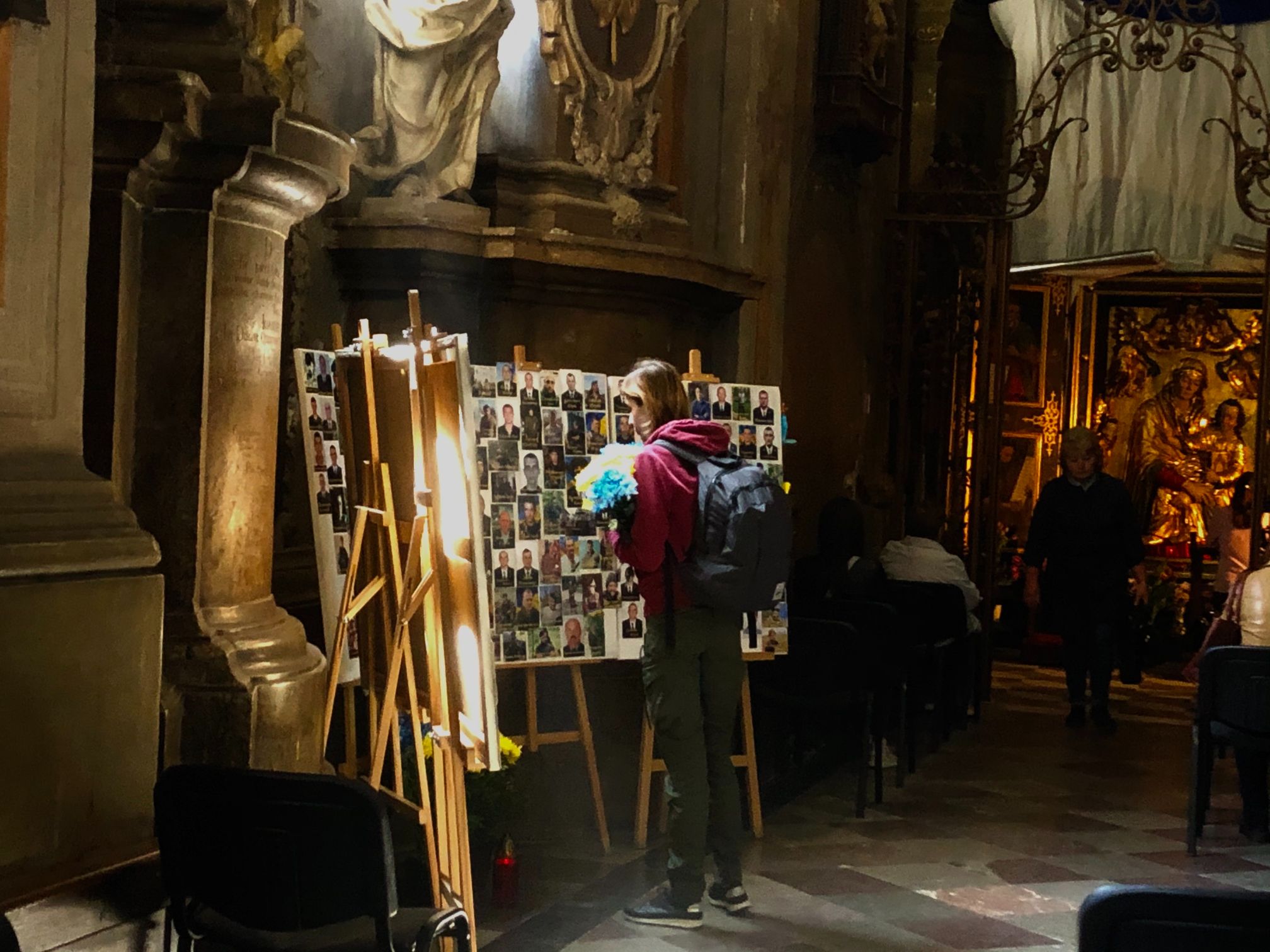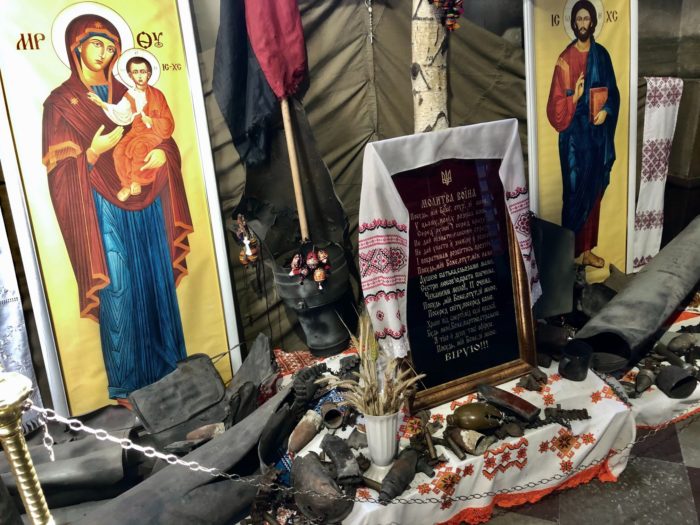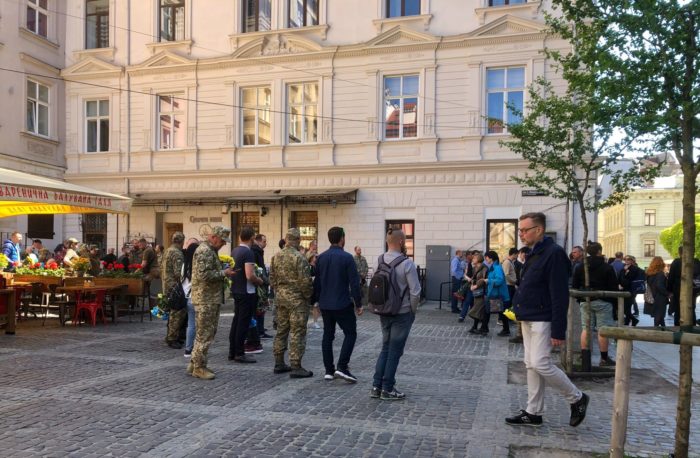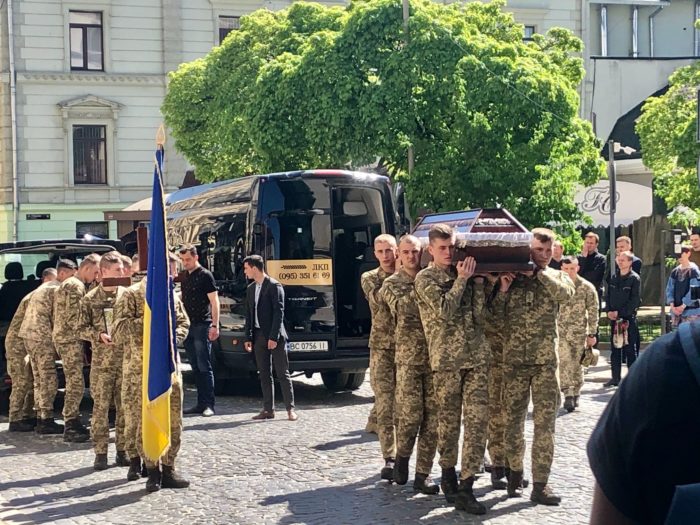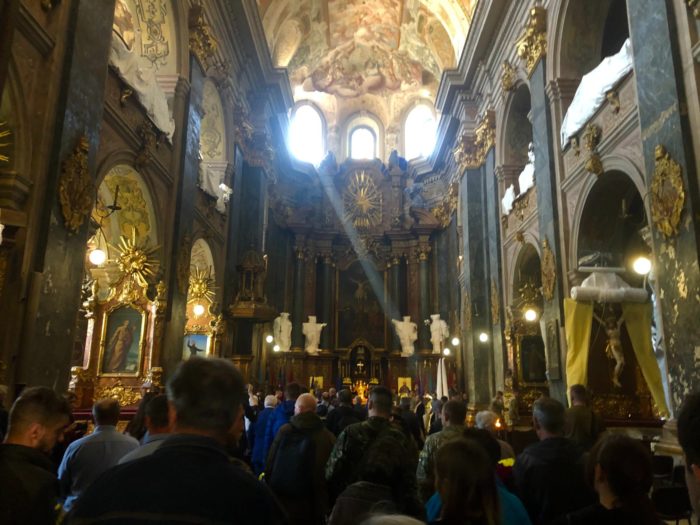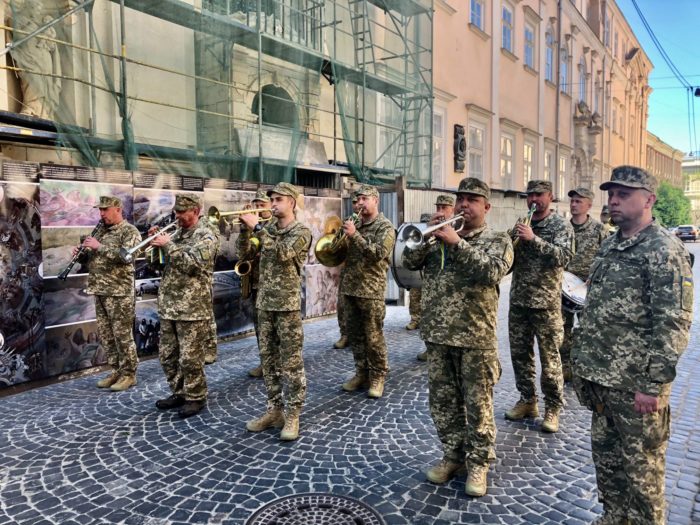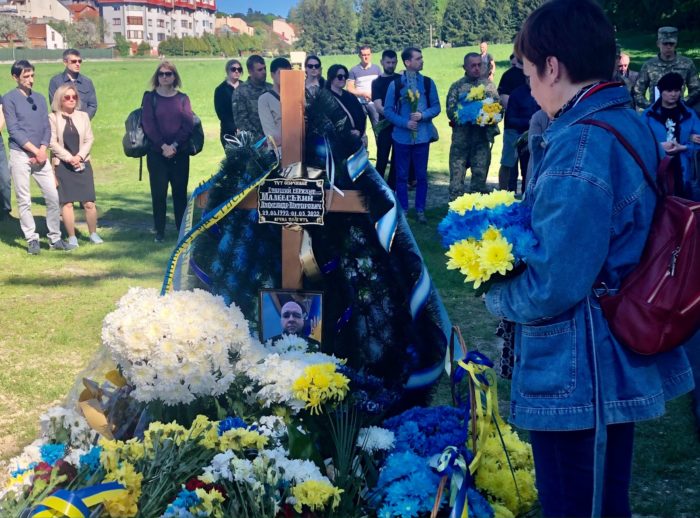We enter a 400-year-old church in Lviv’s city center where ancient frescoes on the ceilings have recently been restored and valuable sculptures wrapped in thick foam rubber to protect them from damage caused by potential airstrikes.
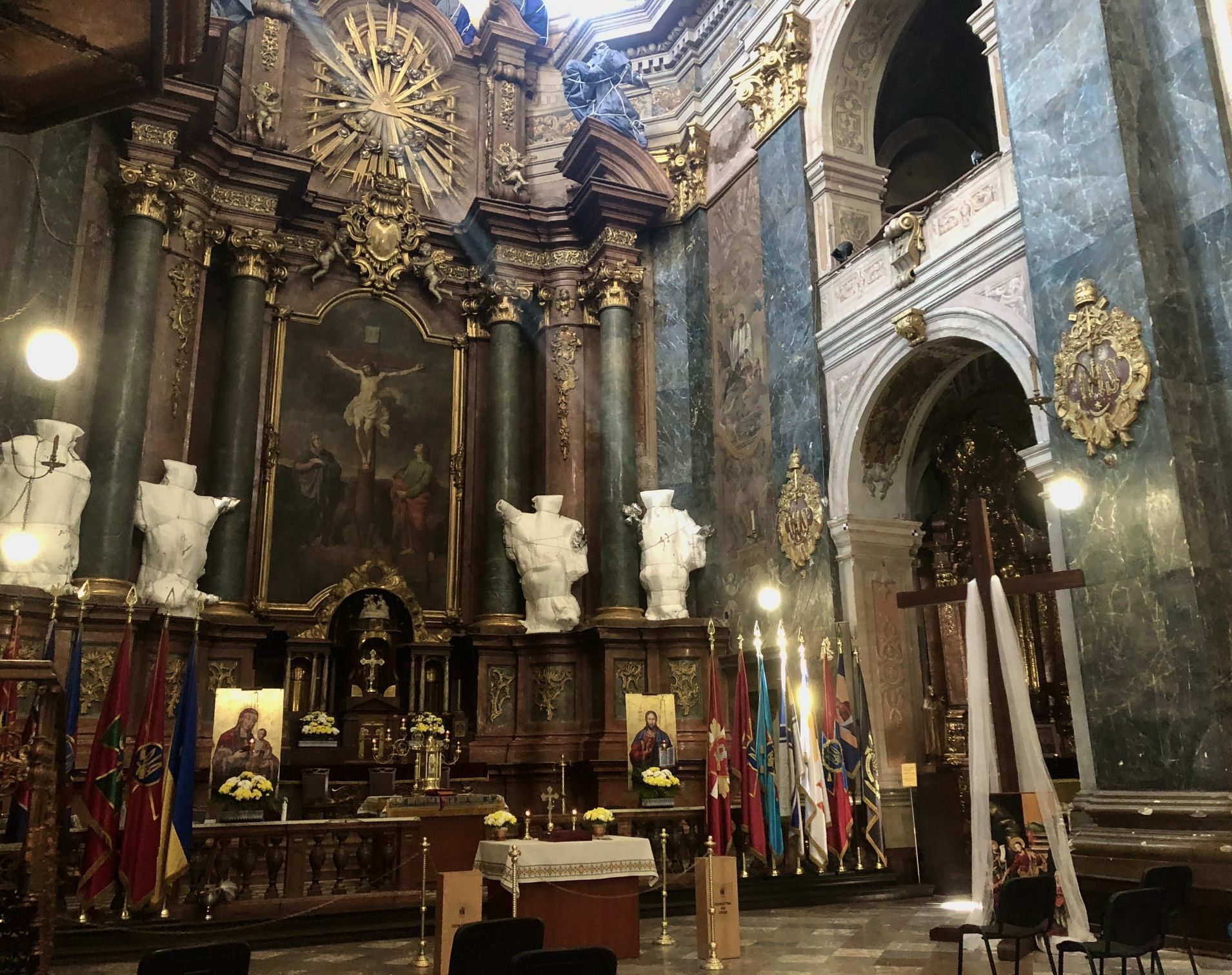
Besides architecture and art, this church has three unique features: firstly flags of Ukrainian military units in a row after the Ukraine state flag.
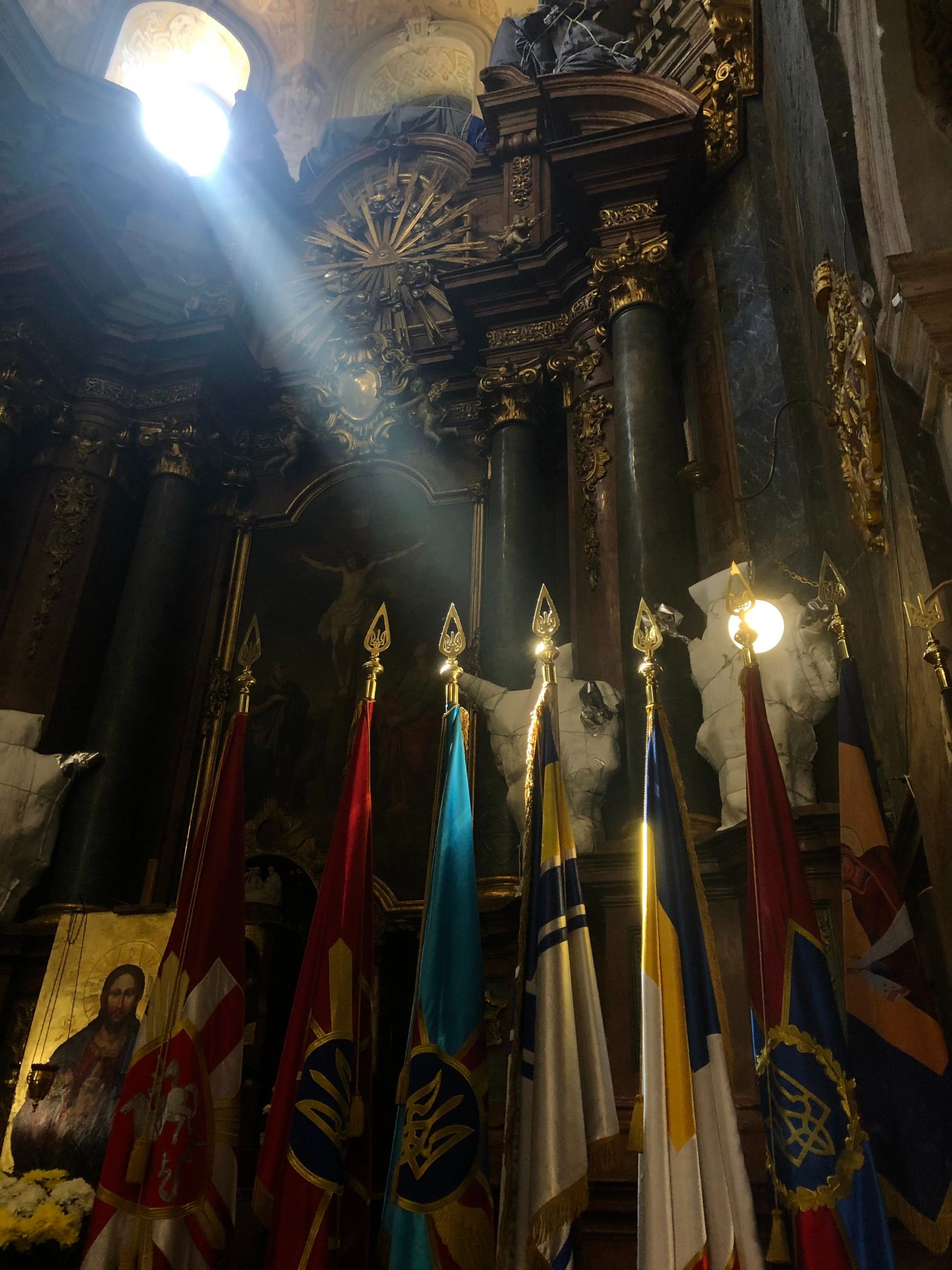
And secondly a symbolic coffin on the right side of the church with the inscription “memento mori.” A good reminder for visitors to not be too focused on their personal comfort, as the units have since 2014 been protecting the people, all the more so since February this year.
The third element is a huge 3-meter birch cross which survived massive shelling by Smerch MLRS in 2014 in Pobeda village of Luhansk Oblast. While everything else was destroyed around it, the cross, icons and figure of the Blessed Virgin nearby remained intact. Lviv natives in the 80th airborne brigade brought the cross to the Garrison Church. Pieces of destroyed equipment and shells lie around the cross. Next to it are displayed pictures of children whose fathers have died in the war since 2014. This is only a part of a bigger collection of portraits that was displayed at Kyiv’s Boryspil international airport. Finally, above the cross there are paper doves hanging on thin strings from the ceiling. They were made by children in 2014. These doves will only be taken away after Ukrainian victory and the return of peace, the church priests told us.
Father Andriy Sidanych meets us in a small office inside the church. He is one of 14 priests serving at the Garrison Church. “Chaplain of the Ukrainian Greek-Catholic Church for the National Guard of Ukraine,” he quoted his full title. The Greek-Catholic Church is the second largest in the country. Having little difference from the Ukrainian Orthodox church in performing liturgy, this church is one of the most modern in its work. It was banned in the USSR as it is formally part of the Catholic church and thus subordinated to Rome.
Due to its history, being formerly a part of Lviv’s fortification wall, the church became the main center of the Lviv chaplaincy shortly before the war started in 2014. Despite the war, the Church also underwent restoration works to save ancient frescoes.
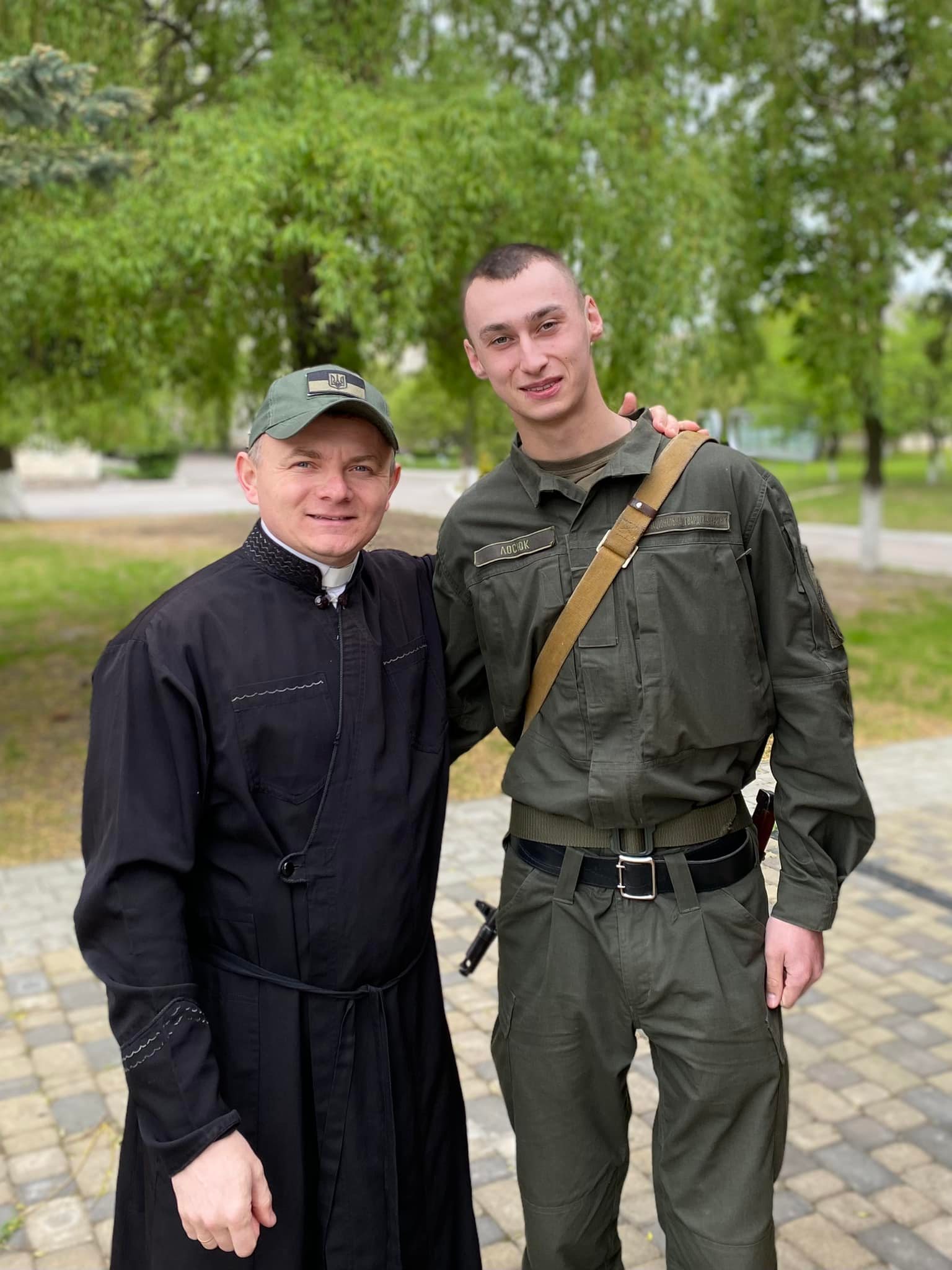
Chaplains run a volunteer center providing military aid and also serve on the frontline
The Lviv military chaplaincy served even before 2011. However, the army was still post-Soviet at the time and priests could visit soldiers or work with them without being especially welcome. Step by step, the chaplaincy became an integral part of military training institutions in Lviv as well as military units located in the city.
“In 2014, when the war started and our guys went to the frontline, we as military chaplains went together with them as volunteers,” Father Andriy recalls. “Since 2017, according to the new law, we can even be officially part of military units. But in 2014 we just went on our own to support the guys spiritually, morally and materially,”
On the frontline, priests were performing liturgies, confessions, and bringing different types of equipment and outfits needed at that time. Similar military chaplaincy centers exist in all Ukrainian big cities and support the military from their oblasts.
“In the beginning we were like tourists. Driving our own cars, packing them full of stuff and going to the front. Then guys saw our Lviv number plates and said that there were a lot of sabotage groups. So, they removed the number plates. Later we became an integral part of the military, moving together with soldiers… Even the simple fact that our guys see us on the frontline means a lot to them. Because earlier we had different trips, meetings with them, going to the mountains and abroad, parachuted together. Starting from the lyceum we went through training together with the guys. We trust them and they trust us.”
2014 was a very hard period when some soldiers were not even provided with uniforms and boots. They had guns but were almost unclothed. So in 2014 volunteering to assist the military started in Ukraine by providing basic things. Hundreds of volunteer centers appeared, and the Garrison Church became one of them. Day by day, more and more church parishioners stepped in; the aid became more sophisticated.
This work did not stop in 2015, 2016 nor even in 2021, as trench warfare has never paused since the Russian invasion of Ukrainian Luhansk and Donetsk Oblasts in 2014. Since Russia’s full-scale invasion on 24 February 2022, the scope of the aid provided by the Garrison Church has increased dramatically. To quote just one example, the parish delivered 30 cars to the front in two months, not to mention other aid.

“We have established the Foundation of St. Nicholas that works mainly for soldiers. Many people donate through the foundation…” Father Andriy started explaining how they raise money to support military units when suddenly a soldier came to the сhurch cabinet where we were talking.
“Excuse me! Could you tell where it is possible to get things in the Garrison Church?”
“Yes, I will tell you. What do you need?”
“First of all, I’m interested in good boots.”
“Which unit are you from?”
“125 [territorial defense brigade].”
“Aren’t you from the part that already had to leave [for the front]?”
“We are in the process (of doing so).”
“Wait a minute. I will call the colleague who is on shift, he will help you.”
The 125th brigade, like most other territorial defense brigades, was created fully just a month before the war. The brigades add another 100,000 troops to the Ukrainian military. However, the state was unable to provide everything required for this number of newcomers, not including people who were mobilized to serve in other regular units. So volunteer help became vital again. And as in 2014 it started providing everything from boots to drones. However, this time the volunteer help was not for a few thousand in volunteer battalions. Now the task is to equip hundreds of thousands who are preparing to join the 200,000 regular troops already fighting.
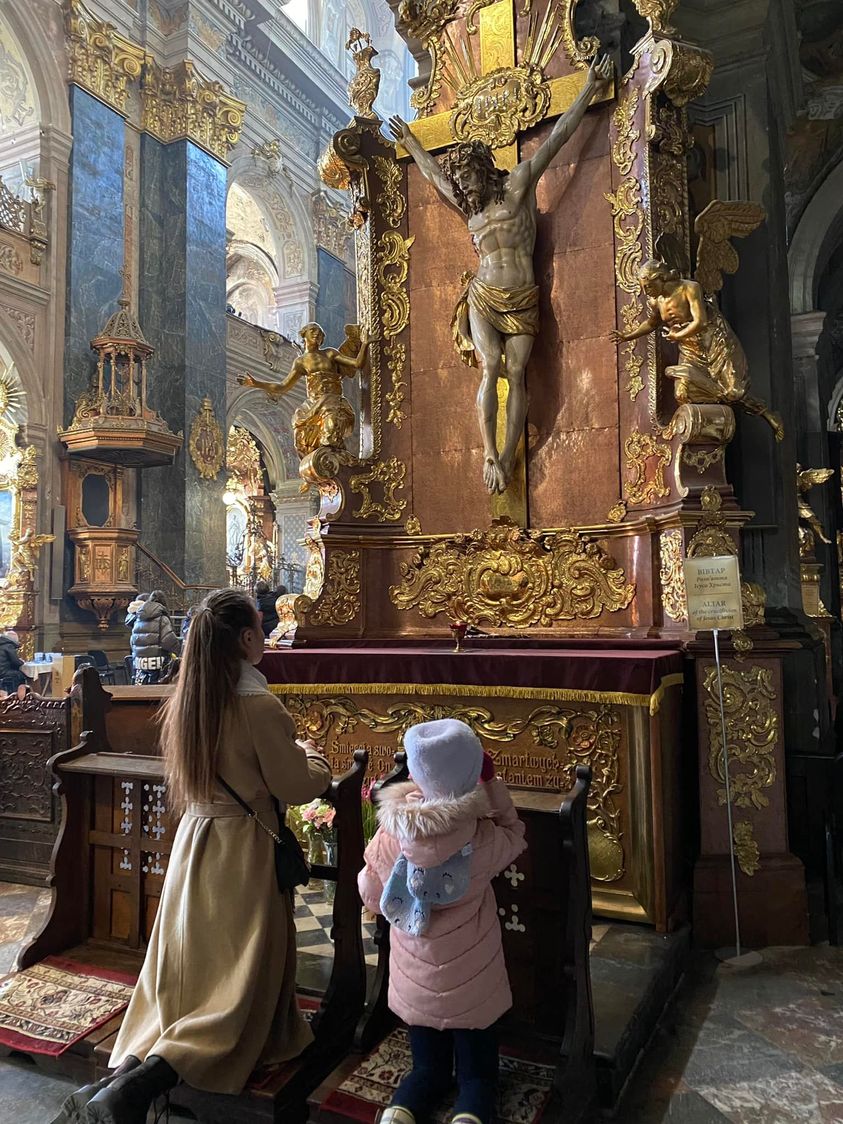
Clothes, sleeping bags, generators, medical aid, food, thermal cameras, optics, body armor and other things – Father Andriy lists what they are providing for the military. Some people abroad help priests to purchase things there but they also have entrepreneurs here in Ukraine who donate things at cost price.
The 14 military chaplains at the Garrison Church are the core of the volunteer team. All of them are married, which is permitted in the Ukrainian Church.
“Our priests have a lot of children. One of us said we can also open a kindergarten here,” Andriy jokes.
He recalls how just before the war he still managed to go with his children to the mountains for skiing. But now there is much more work. Chaplains usually go to the eastern front by rotation for one month at a time. Some stay at the front, while others serve in the Garrison Church, pray here and manage the volunteer center.
Obviously, some Ukrainian soldiers are atheists, but chaplaincy is first of all about helping, not about adherence to Christianity, Andriy explains. Indirectly it sometimes happens that former atheists want to become Christians when going to the front. There were even cases where priests conducted the baptism ceremony directly at the train station prior to departure for the front.
A funeral in Lviv Garrison Church and new cemetery field near Lychakiv cemetery
Chaplains from the Garrison Church seem to be the most informal, calm, and kind priests we have ever talked to. It is probably because of the horrors of war and constant encounter of death that the inscription “memento mori” is more meaningful for them and serves to redefine what is important in life.
Andriy says that Garrison church priests have since 24 February 2022 buried more than 70 soldiers from Lviv. They were laid to rest in the Lychakiv cemetery, although soldiers are also buried in other cemeteries in the city and Oblast. It is estimated that at this point Ukraine has already lost more than 5,000 soldiers killed in action, a huge price for victory, although the number of Ukrainian fatalities has not been officially announced.
“Funerals are a painful moment for everyone and especially for a chaplain, because we bury those whom we knew and helped. Recently, I buried a childhood friend. The most painful are moments when we perform a wedding and then in a few days we have a funeral for the very same soldier killed at the front. We had such a case recently, where only three days passed between the wedding and funeral of Yarovyi Mykyta.”
The day we came to the church to agree on our meeting with Father Andriy, we saw a girl with a blue-yellow bouquet, which these days are brought to soldiers’ funerals. One was about to start, and we decided to stay.
Before the funeral ceremony, the priests of the Garrison Church told people that during the liturgy they could approach and say goodbye to the dead. Coffins were not open and in their heads, flags of the military units of the killed soldiers were placed. Lviv servicemen held portraits of killed comrades. A man in a military uniform near us wiped away tears from time to time. Flowers were mainly blue and yellow - the colors of the Ukrainian flag.
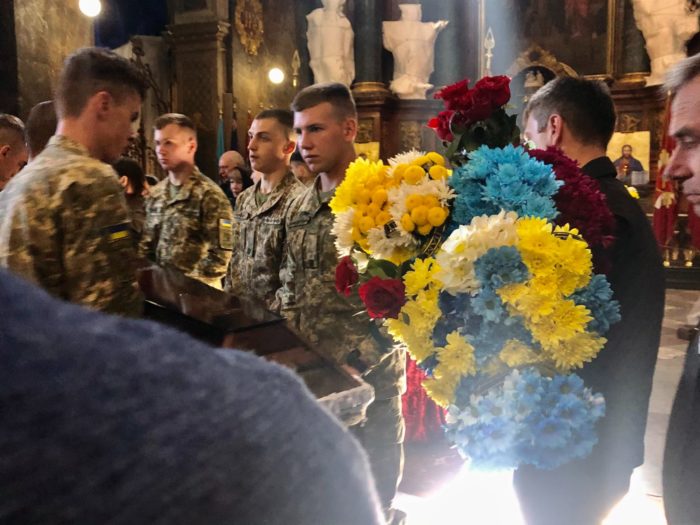
When the servicemen were carrying coffins out of the church, people stood to the sides with tears in their eyes. Outside the killed soldiers were met by the sounds of a military orchestra.
“Around the corner, buses will take and bring back everyone who wants to go to the Lychakiv cemetery. Please come
,” shouted a woman in a few minutes. Six municipal buses awaited. While on the way, servicemen in the bus discussed the situation on the battlefield and with the supply of weapons.
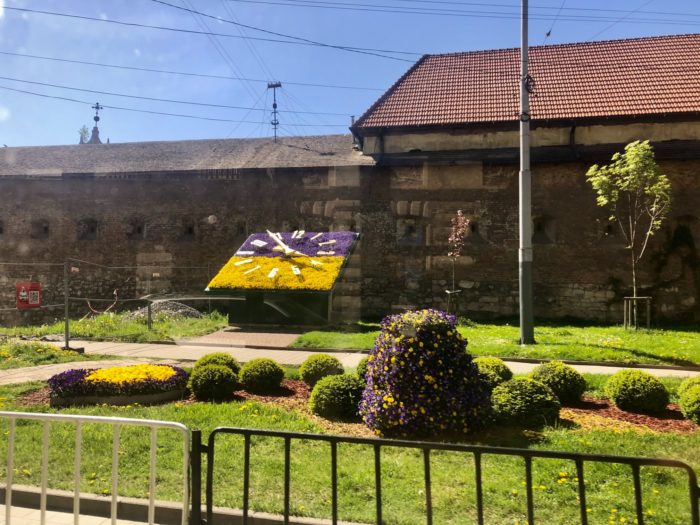
By the end of March, there was already no space left in Lychakiv cemetery, and a new burial place was arranged outside the territory of the cemetery, which was called the Field of the Heroes. Next to it, commanders and soldiers of the Ukrainian Insurgent Army (UPA) who fought against Nazis and Soviets in 1942-1953 were buried. During the ceremony, Ukrainian flags were placed on the coffins. They were then handed over to the soldiers’ wives.
“There will be a dinner for the relatives and friends,” a woman approached us at the end of the burial.
“We are not relatives,” we replied. “Do you know how and where he died?”
“I know, but I am not sure if I can say it… You’d better ask his wife,” she said pointing to the military woman near the grave. “I can only say they were fighting together when he was killed.”
After the funerals we came to the old burial place inside the cemetery. Ukrainian soldiers who died in February and March were buried there, as well as those who died in war from 2014. While approaching the spot, we passed the graves of writer Ivan Franko, artist Ivan Trush, opera singer Solomiya Krushelnytska and many other famous Ukrainians.
Lychakiv Cemetery, Lviv: an open-air museum of history, culture, art and remembrance
Besides us, there are three other people here, a man and a woman aged about 50, and the young girl. They are cleaning the light bulbs near one of the recent graves.
“Now they are so clean that you can put them in the house,” the girl said. While a man and a woman stay silent, she continues to talk as if trying to console them.
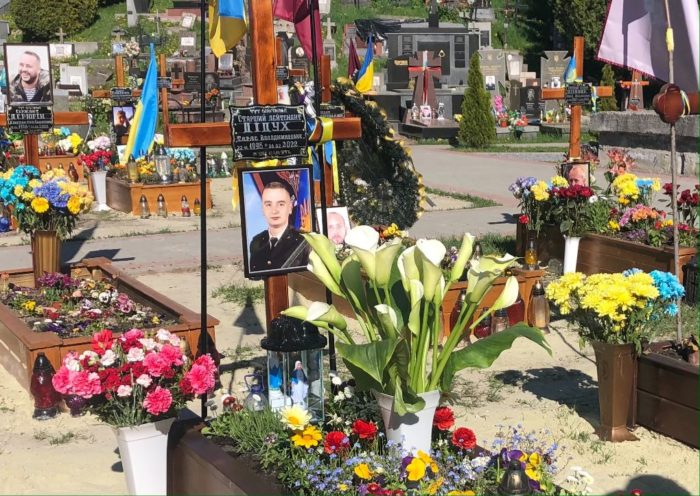
We warily approach them and ask if they can tell us what happened to the young man in the picture, as it turned out their only son who was 22 years old. “What to say here?” she says calmly. We are silent for some time. Then she quietly and calmly starts to tell his story, while a girl and a man continue occasionally adding some details:
“He first studied at the Lviv Military Lyceum Heroes of Kruty. Then he graduated from the Odesa Academy where he studied for 4 years. He really wanted to be a paratrooper, he did not want to be in other military units. Immediately after the academy he went to the war in Donbas. He was twice there, first in Shyrokyne, and then in Stanytsia Luhanska. Taras [Didukh] signed a contract for 5 years. He was a platoon commander.
He died in Kherson Oblast near Nova Kakhovka, near the village of Shylova Balka. Two weeks before the war they were at the Shyrokyi Lan military base near Mykolayiv and were already going to rotate in Donbas. But while they were there, the war started, so they started fighting in that area.
We do not know exactly how he died, they say that artillery covered their column from above and he received a shrapnel wound to the back of the head, damage to the main vessels. He called us only on the first day on 24 February, and then just wrote. He wrote that everything was fine.
There are a lot of guys from the 80th
brigade here. This whole row… What more to say here?.. There are no words. It is impossible to accept that. I still do not believe that it is so. He was my only son.”
“Is she his sister?” we ask.
“A girlfriend,” she replies.
In addition to volunteering and chaplaincy, the Garrison Church helps families who have lost their loved ones. Priests gather with families not only at the time of the funeral but also every month since 2014. On the last Saturday of every month, they pray at the cemetery and then have a common dinner with all families who lost their loved ones at war. It is easier for those people who live through such painful grief when they meet those who went through similar situations. Father Andriy says they also encourage families, who lost their children due to war, to adopt children and live for them because life must go on.
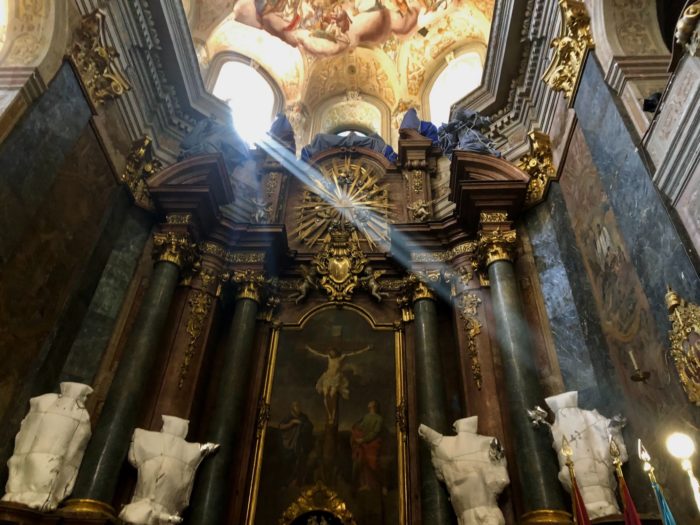
Moral support
While serving on the frontline, there are also moral dilemmas and one should endeavor to act out of love, not hatred, Father Andriy says. This is the key to the spiritual and psychological strength of a soldier:
“Still, despite the war and destruction, soldiers feel that it is not natural for humans to kill. This is testimony that our soldiers are Warriors written from a capital letter, and don't want to be like the enemy, to take revenge and destroy. We explain that there is a duty to protect. The evil that attacks us should be stopped because otherwise the consequences will be even worse. Soldiers should serve for love, not because of hatred. Every soldier of ours loves their land, their parents, family and took a weapon to protect them.”
When asked what is currently the most required support for soldiers, Andriy said that prayers are.
“There are many situations when guys say that projectiles either do not reach them or do not explode. Yes, there is a need for material support that soldiers ask for and obviously we should provide this.”
“But the main thing for us here is to change ourselves during the time of war and make a reliable rear,” Father Andriy concludes. “Because they are fighting there so that we can live here in peace and serenity. We want it to be that when soldiers return, they will see everything has become better here.”

